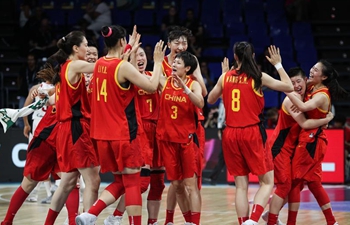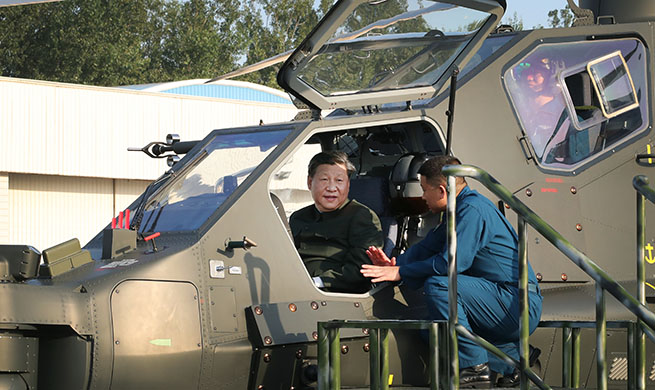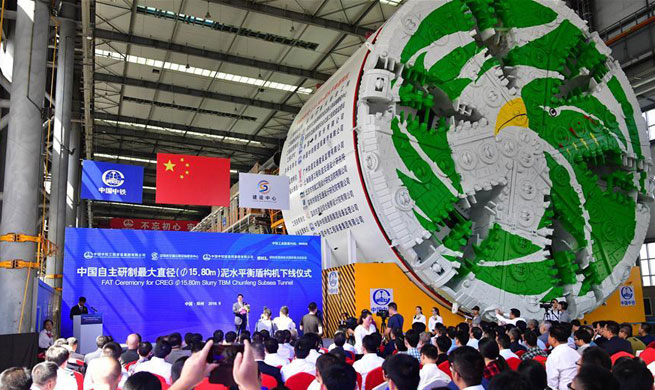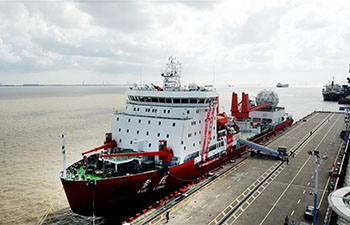by Peter Mertz, Gao Shan
DENVER, the United States, Sept. 27 (Xinhua) -- The economically powerful and deeply-rooted U.S. sports community met in Denver this week where the trade friction with China took center stage.
"Our members are very concerned," said the U.S. Sports and Fitness Industry Association (SFIA) President and CEO Tom Cove.
"I personally testified to the U.S. Trade Representative against the tariffs ... we do not think that the idea of a trade war is the way to resolve the issues," he told Xinhua.
SFIA has been in business for 112 years and represents more than 1,000 sporting goods and fitness brands, manufacturers, retailers and marketers in the industry.
It also represents 3,000 business locations, plants and distribution centers that employ more than 375,000 people and generate 150 billion U.S. dollars in domestic revenue.
In an exclusive interview with Xinhua on Thursday, Cove, whose organization speaks for an industry with enormous revenues and value, had nothing good to say about the tariff war.
According to a CreditCards.com survey released in 2017, Americans spent more than 100 billion dollars in the previous year on sporting events, athletic equipment and gym memberships.
There's little question of the titanic economic weight of an industry deeply woven into America's cultural fabric.
PENDING CRISES
Industry insiders said they are most concerned that the additional import tariffs will hit them right between the eyes.
"The (President Donald) Trump administration has pretty much promised to put tariffs on the remaining products coming from China," said David Cohen, a Washington, D.C. attorney who specializes in international trade.
Cohen's D.C. law firm specializes in providing strategic advice to a wide range of clients, many in sports-related enterprises.
Cohen addressed SFIA members at Denver's historic Brown Palace Hotel on Thursday with a talk titled "The Taxing World of Tariffs - How Trade Policy is Affecting the Sporting Goods Industry".
It was the most highly attended seminar of the three-day SFIA annual conference, and certainly the 2018 "hot potato" topic.
Outside the Brown Palace's Grand Ballroom, one sports apparel company president was seen shaking his head and lamenting to a colleague, "We're both very exposed by this trade war."
Another SFIA official told Xinhua: "Our members are getting hammered."
BAD ODDS
"If the Chinese keep their word, then they will retaliate, and then the president (Trump) will go after the remaining products, which include footwear and apparel," Cohen told Xinhua. "And those companies are shaking."
"It will be very broad, very deep, and very painful," said Cove.
Sporting goods store sales in the United States amount to more than 45 billion dollars annually, and in 2018, the global sports apparel market was estimated to generate about 174 billion dollars in revenue, according to Statista, an online statistics database.
"Right now, it has been hats, bags, and gloves," said Cove. "If you are in those businesses, it is extremely real, and extremely painful right now," he said.
BEARING THE BRUNT
Cohen's presentation focused on ways sports companies can deal with the anticipated tariffs, that ranged from companies absorbing the costs or passing them on to customers, cutting staff, modifying products, or moving out of China.
"China is a huge producer of the variety of products that are imported into the United States, from medical devices, to bats and balls, to wallets, to headgear, to microscopes -- a huge array of products that are impacted by these tariffs," he said.
Cove said top industry leaders met privately in Denver on Tuesday to discuss the fear of price increases from products made in China being passed down to American sports consumers.
"We do not want to see price increases," he told Xinhua.
CLOUDY FUTURE
Cohen said that sports companies he represents are also scrambling to adjust growth and income projections, with upcoming losses likely that will hurt "their potential for expansion -- or to really invest in people, equipment, or innovation," he added.
"Some companies have used China as their core competency, and have invested brick and mortar, as well as hiring Chinese people," Cohen said.
"You cannot just pick up a building and just move it to Malaysia, or Indonesia, or wherever you might like to produce," said the trade expert.
"If you are a mid-sized company and you are already committed, your switching costs are enormous," said another SFIA conference presenter, Michael Schrage, a research fellow from the renowned Massachusetts Institute of Technology (MIT) Center for Digital Business.
"For companies hoping to take off and become much, much larger, I think the tariffs are a real threat to their growth," he told Xinhua, adding that the impact will "not be as bad for start-ups."
"We believe by sitting at the negotiation table and working through the issues, particularly protecting our brands, that we can resolve this problem," Cove said.
SFIA has been aggressively pushing the administration to stop the trade friction.
"We are troubled by the direction it is going, and we have petitioned both countries to take a different approach," Cove said.
"We think there are better ways to resolve our discrepancies than a tit for tat, back and forth, tariff war," he added.













